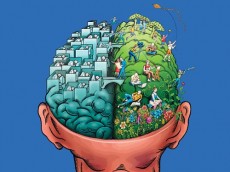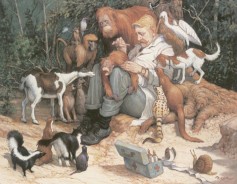This is part one of a five-part article. Subsequent parts will be published daily.
 On the morning of September 11, 2001, biology stopped being a science. For that matter, so did physics and mathematics, but our focus here is on biology.
On the morning of September 11, 2001, biology stopped being a science. For that matter, so did physics and mathematics, but our focus here is on biology.
Historically, the great philosophers and thinkers divided knowledge into four major branches:
First, the sciences, or the things which can be proven empirically — based on evidence and fact.
Second, the arts, areas of knowledge that are best understood through experiencing beauty.
Third, the spiritual, which Aristotle called metaphysics and which many moderns narrowly refer to as ethics.
Fourth, the humane, meaning the realm of organizing and leading human beings, the highest level of which is statesmanship, with social leadership being a close second.
Before 9/11, biology clearly belonged to the branch of knowledge called science. But as the world watched the planes fly into the buildings that day, over and over on our screens, the field of biology moved firmly and irreversibly into the realm of statesmanship.
As early as the 1920s, economist John Maynard Keynes suggested that the 21st Century would be the Democratic Century, as democracy and capitalism would finally spread around the world.
 By the early 1990s, futurists Alvin Toffler and John Naisbitt separately predicted that the 21st Century would be the Asian or the Pacific Century, due to the rising might of China and the other Asian economies.
By the early 1990s, futurists Alvin Toffler and John Naisbitt separately predicted that the 21st Century would be the Asian or the Pacific Century, due to the rising might of China and the other Asian economies.
By the end of the nineties, the Bill Gates and Steve Jobs types suggested that the true explosion of the next hundred years would be technological rather than national — that the 21st would be the Digital Century.
Social conservatives like Robert Bork and Patrick Buchanan even got into the prediction game, envisioning decades of serious crises as we “slouch toward Gomorrah.”
But as big as these trends may or may not turn out to be, one thing will almost certainly eclipse them all: The 21st Century will be the Century of Biology.
And statesmen and social leaders of the future had better prepare accordingly.
But how should we prepare? What exactly does “The Century of Biology” mean?
Simply put, the events of 9/11 and the commencement of the Fourth Turning catapulted biological thinking from the first branch (pure science in pursuit of knowledge) immediately into the fourth branch (thought processes used to organize human endeavors) [1].
 Biology is no longer about the sterile exercise of our intellects to answer questions about living organisms. Now biology has morphed into a means by which societal vitality may be investigated and sustained.
Biology is no longer about the sterile exercise of our intellects to answer questions about living organisms. Now biology has morphed into a means by which societal vitality may be investigated and sustained.
In biology, certain well-trained experts work to maintain health and banish disease from individuals and communities. We call these people healers, physicians, veterinarians, and the like.
In the twenty-first century, certain people, well-educated in the thinking of modern biology, will seek to sustain the vitality and vanquish the ills of society. To my way of thinking, these individuals have only one best, all-encompassing name: statesmen.
[1] Thanks to Dr. Brad Bolon for his help on this article.






Oliver,
Thanks for this post. I’ve just been thinking over the last couple of weeks about the lack of advancement in biology and medicine in the last 30 years. There really hasn’t been anything groundbreaking. Why? Because all (I being one of them) are trained as technicians and experts without a liberal arts education. We are great at thinking about things we can measure and plugging the information into an algorithm, but not good at all at thinking about things in a new way.
The best mentors I had in my scientific and biological training were those who had liberal arts education (even Literature majors from schools like Vanderbilt) before they sought expertise in biology.
Until we re-establish the educational process that helps learners to learn how to think, our scientific, technical, and expertise-levels of education will suffer, and subsequently so will society in general.